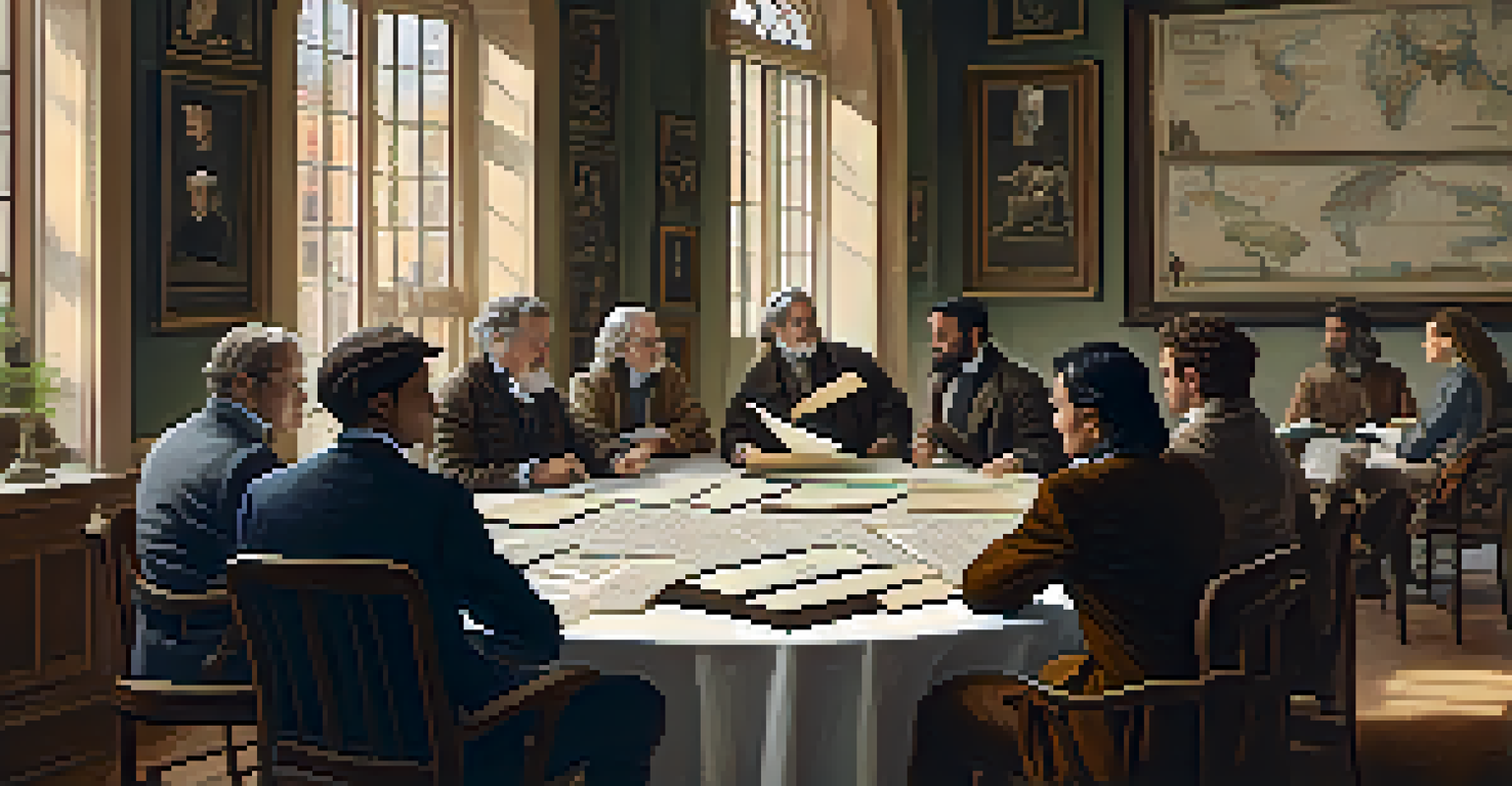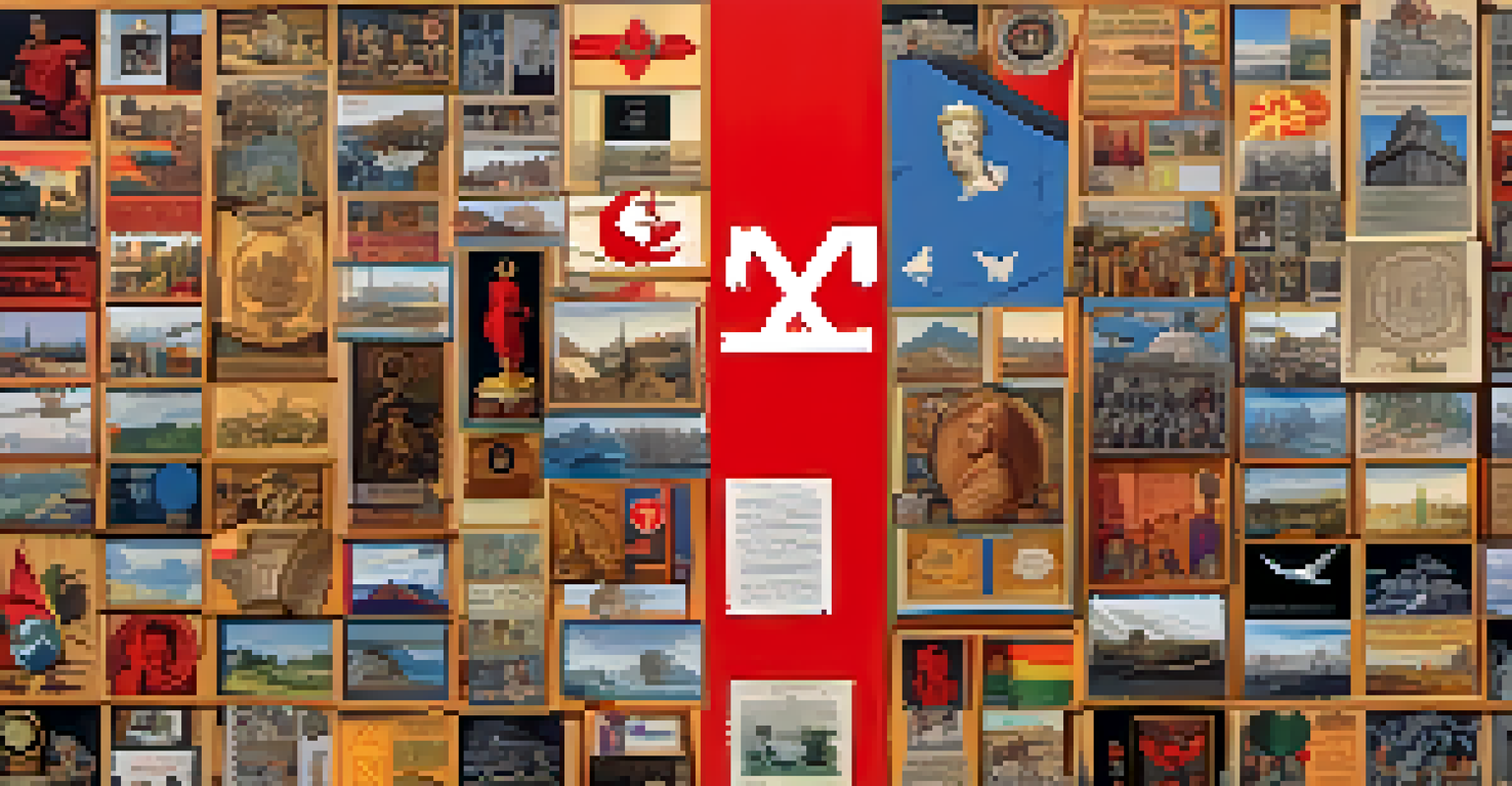The Influence of Historiography on Historical Writing

Understanding Historiography and Its Role
Historiography refers to the study of how history is written and interpreted. It's crucial for understanding that history isn't just a collection of facts; it’s shaped by the perspectives and biases of historians. This means that the way history is recorded can significantly influence our perception of past events.
History is not a mere collection of facts, but rather an interpretation of those facts shaped by the historian's context and perspective.
When historians write about events, they often bring their own experiences, cultural backgrounds, and societal influences into their narratives. This interplay between the historian's viewpoint and the events themselves can create a rich, albeit sometimes skewed, tapestry of historical writing. Understanding this helps readers approach historical texts with a critical eye.
The influence of historiography extends beyond individual historians; it also encompasses broader trends and movements in historical writing, such as Marxism, feminism, or post-colonialism. Each of these frameworks offers different insights and interpretations, which can alter the way we understand history as a whole.
The Evolution of Historical Writing
Historical writing has evolved significantly over the centuries, influenced by various historiographical methods. In ancient times, historians like Herodotus and Thucydides laid the groundwork for factual reporting, but their works also reflected their personal biases and cultural contexts. This early form of historiography set the stage for future interpretations.

As we moved into the Enlightenment, historians began emphasizing reason and empirical evidence, leading to a more scientific approach to history. This shift marked a crucial turning point, as it encouraged historians to base their narratives on verifiable facts rather than myth or legend, although biases still permeated their works.
Historiography Shapes History's Lens
Historiography reveals that historical narratives are influenced by the personal biases and cultural contexts of historians.
In the 20th century, the introduction of new methodologies, such as social history and cultural history, showcased how historiography could adapt to changing societal values and priorities. This evolution illustrates how the act of writing history is not static; it is continually reshaped by the prevailing ideologies of the time.
Key Historiographical Approaches
Different historiographical approaches have emerged over the years, each contributing unique perspectives to historical writing. For instance, Marxist historiography emphasizes class struggle and economic factors, often reshaping narratives around social justice and power dynamics. This approach has greatly influenced how we view revolutions and societal changes throughout history.
The past is not a dead thing, it is a living memory which shapes the present and the future.
Feminist historiography, on the other hand, seeks to highlight women's roles and experiences, which have often been marginalized in traditional narratives. By examining history through a feminist lens, historians uncover stories that challenge existing power structures and provide a more inclusive understanding of the past.
Post-colonial historiography takes a critical look at the impacts of colonialism on history. It encourages historians to reconsider the narratives constructed by colonizers, often revealing the complexities and contradictions in historical accounts that have been dominated by imperial perspectives.
The Impact of Source Selection in Historiography
The sources historians choose to use can greatly influence the narratives they construct. Primary sources, like letters, photographs, or official documents, provide direct evidence of past events, but they can also be selective and biased. The historian’s choice in sourcing thus becomes a reflection of their own historiographical stance.
Conversely, secondary sources, such as books and articles, offer interpretations of primary data but can carry the biases of the authors. By critically analyzing both types of sources, historians can build a more nuanced understanding of historical events, but it requires careful consideration.
Diverse Approaches in Historical Writing
Different historiographical frameworks, such as Marxist and feminist perspectives, provide unique insights that challenge traditional narratives.
This source selection process highlights the importance of historiography in shaping historical narratives. It reminds readers that every historical account is a result of choices made by historians, influenced by their methodologies, biases, and the context in which they write.
Historiography and the Construction of National Narratives
Historiography plays a critical role in shaping national narratives, often aligning history with national identity. Nations frequently craft historical accounts that promote unity and pride, sometimes at the expense of less favorable truths. For instance, the way wars are remembered can vary dramatically depending on the national perspective.
These constructed narratives can influence public perception and policy, as they often reflect the values and goals of those in power. This can lead to a glorification of certain events while overshadowing others, creating a skewed version of history that serves specific agendas.
Understanding the impact of historiography on national narratives enables us to critically evaluate how history is taught and remembered. It encourages a more comprehensive view that recognizes multiple perspectives and acknowledges the complexities of the past.
Challenges in Contemporary Historiography
Contemporary historiography faces numerous challenges, including the rise of misinformation and digital media. With the internet providing a platform for anyone to publish their version of history, discerning credible sources from unreliable ones has become increasingly difficult. This situation complicates the role of historians as traditional gatekeepers of knowledge.
Moreover, the rapid pace of societal change demands that historians adapt their methods and narratives. As new perspectives emerge, historians must navigate the tension between established narratives and the need for inclusivity and representation in their writing.
Source Selection Influences Narratives
The choice of primary and secondary sources by historians significantly impacts the construction of historical accounts and narratives.
These challenges highlight the evolving nature of historiography and its impact on historical writing. Historians today must balance the preservation of factual integrity while also embracing diverse voices and interpretations to create a more comprehensive historical narrative.
The Future of Historical Writing and Historiography
Looking ahead, the future of historical writing will likely be shaped by advancements in technology and changes in societal values. Digital humanities, for example, offers exciting opportunities for historians to analyze and present data in innovative ways. This could enhance accessibility and engagement with historical content for a broader audience.
Additionally, as global awareness and intercultural exchange increase, historians may find themselves more inclined to adopt interdisciplinary approaches. Collaborating with fields such as anthropology, sociology, and even art can lead to richer, more diverse historical narratives that account for various perspectives.

Ultimately, the interplay between historiography and historical writing will continue to evolve, reflecting the dynamic nature of society itself. As historians embrace new methodologies and perspectives, we can look forward to a more inclusive and multifaceted understanding of our past.